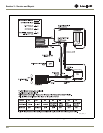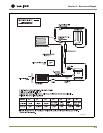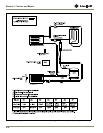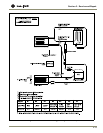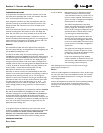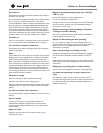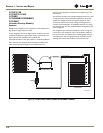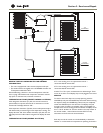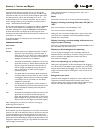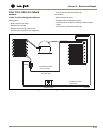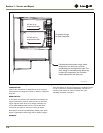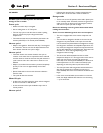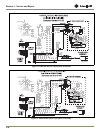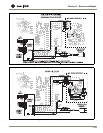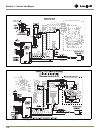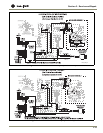
3-16
Section 3 - Service and Repair
suspected of not operating correctly, you can run through this
sequence to ensure each component is turning on and off through
the board correctly. Go into service mode and choose option #22.
This will cycle every relay on and off showing 10 11 20 21 …. If a
component fails to turn on when the relay does, you can verify if
there is voltage present by using a voltmeter to check the board
output. 1 means ON and 0 means OFF.
To view the actual refrigerator (T1) temperature, hold the WARMER
key until the actual temperature is displayed. To view the actual
thermistor readings for 2-4, hold the WARMER and COLDER keys
for about five seconds. The display will cycle through the three
thermistors and their temperatures. If a thermistor is unused in a unit
it will show a “0” reading.
In the general section the methods to enter some other service
modes are available.
TROUBLESHOOTING:
Error Codes
E1, E2, E7,
E8 & E9 Bad thermistor errors. Replace thermistor. Check for
thermistor errors by accessing “View thermistor #
status (2, 19, 20, or 21).” If the error code is repeated,
the thermistor is open or shorted. If a temperature is
displayed, the thermistor is not defective.
E3 This will be accompanied by a beep every minute. This
signals that the door (or bottom drawer) has been left
open for longer than 20 minutes. Close the door to
reset. If the light and display do not go off when the
door is closed, check to make sure the magnet is
positioned properly.
E5 This signals that the unit has been above set-point for
more than twelve hours by at least 10°. If the unit was
just plugged in, leave for 24 hours to see if the problem
is corrected. If it is not corrected, it is most likely a
refrigeration system issue.
E6 This signals that the refrigerator section has been at
least 10° below set-point for at least twelve hours. This
would most likely be caused by a bad relay and the
circuit board.
E10 This will be accompanied by a beep every minute. This
signals that the top drawer has been left open for
longer than 20 minutes. Close the door to reset. If the
light and display do not go off when the door is closed,
check to make sure the magnet is positioned properly.
After checking the errors, be sure to clear the error log by
performing service option 12.
Excessive Frost on evaporator
Force a defrost cycle via the keypad input or shut down unit and thaw
if frost is very thick. If the evaporator clears, it was due to some type
of abnormal operation. If the unit will continue to be used in this
manner, the defrost length can be lengthened in the service menu to
prevent future issues. Extending this length may be detrimental to the
refrigerator temperature. During very long defrosts the temperature
may raise higher than desired.
During the forced defrost no heating will occur. This is just a
prolonged off cycle.
Noise
Some noise is normal such as a hum from the fans/compressor.
Display is showing something other than “SP (38)” or
“ER.”
Push one of the keys to see if the display is reset.
Turn unit on and off via the display pad.
Unplug unit, wait one minute and plug back in. If any of these steps
returns the unit to operation, the unit was probably accidently
entered into a service mode.
Display is showing a random snaking of characters or a
degree symbol is flashing.
The unit is in a special showroom mode. Hold the COLDER key and
press the LIGHT key three times to exit.
Display not illuminating but unit operating
First try to plug and unplug the unit. If the display still does not
illuminate there is a four-wire pin connector running from the main
board in the base to the display board. One of the wires is
disconnected or damaged.
Unit is not operating—no cooling—no fans.
Unplug unit and plug back in. If main boards beeps when plugging in
the unit then this is most likely a system problem, not a board issue.
If board does not beep when plugging in the unit, check the power
supply to ensure the outlet is working. Also, check the fuse on the
circuit board.
Refrigerator too warm
Check the actual refrigerator temperature. If set to 38°F, the actual
temperature should be between 36°F and 40°F during normal
operation. Recent door openings, product loading or defrost cycles
will push the temperature higher for short time periods.



